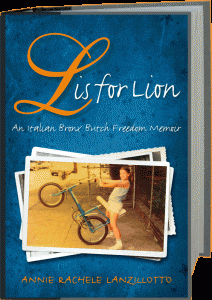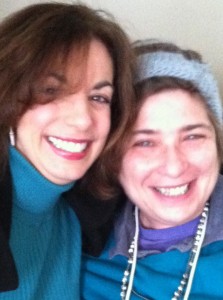by Nancy Caronia
I was Evel Knievel. I was a Spaldeen. Yes Mom, I am made of rubber. I got a pink rubber soul. – Annie Lanzillotto, L is for Lion (34)

This spring at URI’s LGTBQ Symposium, Annie Lanzillotto spoke eloquently about gender identity and how she became a performance artist, writer, singer, world traveller, cancer survivor, and Tony’s Grandma Nunzio for an Off-Broadway revival of Tony and Tina’s Wedding. The students in my WRT 270: Writing in the Expressivist Tradition course were fortunate to have her visit before her talk that evening. They were surprised by her honesty and commitment to create community in the 75-minutes we were together. I brought a Spaldeen ball—a central conceit in her memoir L is for Lion: An Italian Bronx Butch Freedom Memoir, recently nominated for a Lambda Literary Award. The Spaldeen was a reminder of the ways in which Annie had to bounce back from numerous challenges. It was the rubber ball of her youth, which taught her as much about life as it did stoopball and stickball.
She eagerly took the ball from me and threw it from student to student, asking in her thick Bronx accent: “What’s your name? What do you want me to talk to you about today?” At first, they didn’t believe her questions. I suppose they thought she would show up and espouse her ideas on what it takes to be a great writer. But Annie refuses passivity from anyone. I could see by the looks on their faces that they weren’t sure what to do with the ball and what to make of Annie, but Annie is nothing if not patient. More important, Annie knows everything about how to work a crowd. She bounced the ball as one student tentatively asked a question. She used the bounce to create suspense, to formulate a compassionate response, to listen to their breathing, and to assess the vibration of the room. The ball became the metronome of our meeting. It became our heartbeat as one by one students opened up about their hopes and fears about writing, about school, about life. They asked how to write the hard truth. She was gentle, but prodding. They asked how long it takes. She said, your whole life. They asked how she was able to be so brutally honest. She answered with another question: What choice do I have? They were moved that she gave so much to them when she had already given them so much in her memoir.
 In my introduction of Annie at the symposium that evening, I said, she “contains multitudes.” I purposefully recalled Walt Whitman and his “Song of Myself” since Annie, for me, is nothing less than the spiritual sister to Whitman. Like America’s iconic queer poet, she is “not a bit tamed” and chooses to “see, dance, laugh, [and] sing” with abandon. Like Whitman, too, she sounds her “barbaric yawp over the roofs of the world.” From the Bronx to Manhattan and Egypt, Italy, California, and, yes, even Rhode Island, she witnesses and interacts with the lives circling around her to create an American voice that recognizes the present moment of those most likely to be forgotten or stereotyped. Her “I,” like Whitman’s all seeing, all speaking “I,” honors everyone and everything, including the healing properties of garlic and lasagna. She makes space for the “old and young,” and “the foolish as much as the wise.” She does not judge someone for his or her station in life. She does not see pedigree—she honors spirit. She witnesses action; she witnesses speech; she witnesses silence most of all.
In my introduction of Annie at the symposium that evening, I said, she “contains multitudes.” I purposefully recalled Walt Whitman and his “Song of Myself” since Annie, for me, is nothing less than the spiritual sister to Whitman. Like America’s iconic queer poet, she is “not a bit tamed” and chooses to “see, dance, laugh, [and] sing” with abandon. Like Whitman, too, she sounds her “barbaric yawp over the roofs of the world.” From the Bronx to Manhattan and Egypt, Italy, California, and, yes, even Rhode Island, she witnesses and interacts with the lives circling around her to create an American voice that recognizes the present moment of those most likely to be forgotten or stereotyped. Her “I,” like Whitman’s all seeing, all speaking “I,” honors everyone and everything, including the healing properties of garlic and lasagna. She makes space for the “old and young,” and “the foolish as much as the wise.” She does not judge someone for his or her station in life. She does not see pedigree—she honors spirit. She witnesses action; she witnesses speech; she witnesses silence most of all.
In L is for Lion, she writes with equal honesty, pain, and love about her family, especially her father Lanzi, her mother Rachel, her grandma Rose. She remembers the nuns at her Catholic schools, friends and lovers such as Johnny Denaro, with whom she marches in one of the first AIDS walks in NYC, and her long-time partner Audrey, who emerges as a peacemaker through numerous illnesses and family struggles. She honors the Egyptian cab driver Yusef, who gains her entrance to the teachings of Islam while she lives in Egypt researching the etiology of a local parasite. She engages with and is both witness and recipient of the benevolence and good works of doctors and staff like Dr. Kempin and Cecil the greeter at Sloan Kettering.
Annie, like Whitman, refuses to shy away from the difficult issues of our times. Whether she writes about the violence in her family, sings and performs about Italian tradition, marches to remember those who have perished in the Triangle Shirtwaist Factory and from AIDS, creates healing rituals with garlic and Spaldeens, or researches cancer, Annie confronts prejudices with regards to issues of class, ethnicity, cancer, and, most especially, as it related to URI’s LGBTQ symposium, gender. In her life, Annie has stood before cancer, classists, xenophobes, and homophobes and refused to give in to their negative and destructive energies. She believes in the bounce of the Spaldeen—that where you set your energy and love—that will be returned to you ten-fold. At the same time, she is “ever regardful of others” as she reveals the world in all its beauteous imperfection.
Lest you think I exaggerate, here are some of Annie’s credentials. She has a B.A. in medical anthropology from Brown University where she graduated with honors while undergoing treatment for Hodgkins, which was first diagnosed when she was nineteen and about to enter Brown. She earned an MFA from Sarah Lawrence and has received numerous awards, fellowships, and grants for her writing and performance art, including from the New York Foundation for the Arts, Dixon Place, the Franklin Furnace, and the Rockefeller Foundation. Currently, she is a Writer-in-Residence at New Jersey City University and just finishing up her run as Grandma Nunzio.

Annie’s presence on the URI campus was a joyful and thought-provoking day. She infused my students with a sense of determination about figuring out what stories they needed to tell, and her visit strengthened the trust that we had for each other and our work. She inspired them to show a bit more of who they were and not who they thought we wanted to see. It may have been a cold, cold February, but Annie arrived just in time to warm our tired from the winter hearts. Now, each of you will have a chance to read Annie’s vision and power in the latest issue of OSR.
—
Nancy Caronia is a Pushcart Prize nominated writer whose work has most recently appeared in New Delta Review, Lowestoft Chronicle, and 94 Creations. She and Edvige Giunta have co-edited Personal Effects: Essays on Memoir, Teaching, and Culture in the Work of Louise DeSalvo (Fordham University Press 2014).
